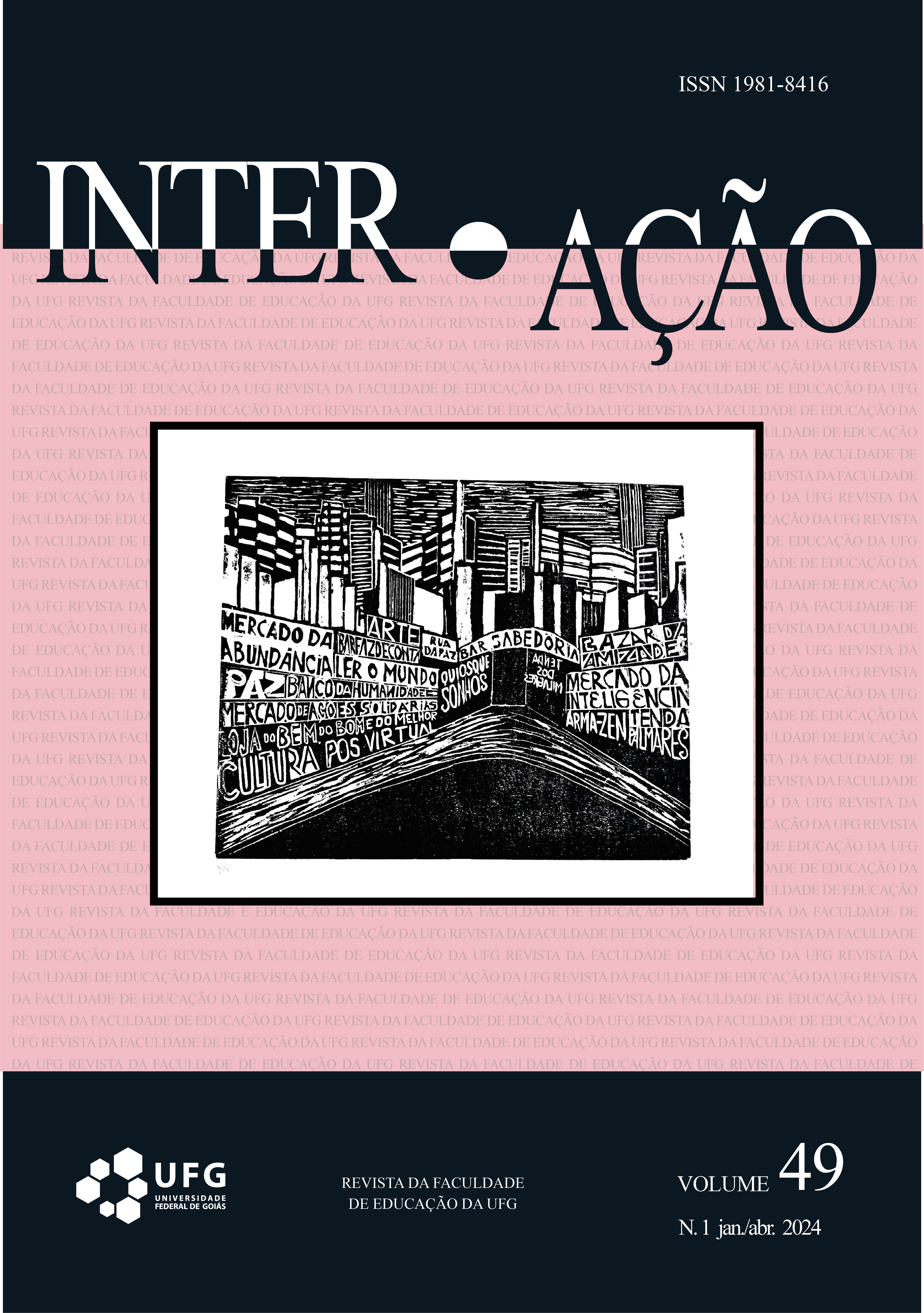EDUCATION PROFESSIONALS, DIGITAL IMMIGRANTS AND THE CHALLENGE OF REMOTE TEACHING
DOI:
https://doi.org/10.5216/ia.v49i1.76107Keywords:
TDICs; Teacher Training; Digital Immigrants.Abstract
This article aims to analyze the challenges experienced by experienced teachers when returning to daily teaching with the changes in the organization of teaching and learning caused by the fight against the Coronavirus pandemic. A qualitative research approach, and for data collection, research forms (Google Forms) were sent to teachers at the Municipal Department of Education, with the aim of knowing the skills they had regarding the use of computers and, also, a semi-structured interviews were carried out with six teachers with teaching experience ranging from 22 to 39 years and who teach in a public school in a municipality in the interior of Bahia. The interviews were carried out with the help of the WhatsApp application during the 2020 academic year, the year in which he began to carry out teaching activities remotely, with the purpose of knowing their opinions regarding the tools used in classes and the difficulties they brought. for teaching work. Finally, it was possible to understand their perceptions, hopes and fears about the organization of education at school, at that time of changing methodologies and practices, as well as knowing how the teachers saw their future in an education that is now more technological and dependent on tools that, until then, according to their own statements, they did not know existed
Downloads
References
ALMEIDA, Patrícia de. Tecnologias digitais em sala de aula: o professor e a reconfiguração do processo educativo. Da Investigação às Práticas: Estudos de Natureza Educacional, [S. l.], v. 8, n. 1, p. 4–21, 2018. DOI: 10.25757/invep.v8i1.124. Disponível em: https://ojs.eselx.ipl.pt/index.php/invep/article/view/124 . Acesso em: 21 fev. 2024.
ALMEIDA, Maria Elizabeth Bianconcini de. Tecnologias na Educação, formação de Educadores e recursividade entre teoria e prática: trajetória do programa de pós-graduação em educação e currículo. Revista E-Curriculum, São Paulo, v. 1, n. 1, dez./jul. 2005. Disponível em: https://revistas.pucsp.br/index.php/curriculum/article/view/3165. Acesso em: 21 fev. 2024.
BEHAR, Patricia Alejandra. O Ensino Remoto Emergencial e a Educação a Distância. Rio Grande do Sul, 2020. Disponível em: https://www.ufrgs.br/coronavirus/base/artigo-o-ensino-remoto-emergencial-e-a-educacao-a-distancia/. Acesso em 20 out. 2022.
BORBA, Marcelo de Carvalho; SILVA, Ricardo Scucuglia Rodrigues da; GADANIDIS, George Gadanidis. Fases das tecnologias digitais em Educação Matemática. 2. ed. Belo Horizonte: Autêntica. 2018.
CARDOSO, A. C. S. Pro-tecnologia: uma abordagem de formação inicial de professores para o uso das tecnologias digitais. Educ. Form., [S. l.], v. 1, n. 3, p. 50–70, 2016. DOI: 10.25053/edufor.v1i3.1890. Disponível em: https://revistas.uece.br/index.php/redufor/article/view/113. Acesso em: 1 maio 2024.
CIBOTTO, R. A. G.; OLIVEIRA, R. M. M. A. TPACK – Conhecimento tecnológico e pedagógico do conteúdo: uma revisão teórica. Imagens da Educação, [s.l.], v. 7, n. 2, p. 11-23, 7 jun. 2017. Disponível em: https://periodicos.uem.br/ojs/index.php/ImagensEduc/article/view/34615. Acesso em: 01 maio 2024.
CUNHA, Leonardo Ferreira Farias da; SILVA, Alcineia de Souza; SILVA, Aurênio Pereira da. O ensino remoto no Brasil em tempos de pandemia: diálogos acerca da qualidade e do direito e acesso à educação. Revista Com Censo: Estudos Educacionais do Distrito Federal, Brasília, v. 7, n. 3, p. 27-37, ago. 2020. Disponível em:
https://periodicos.se.df.gov.br/index.php/comcenso/article/view/924/553. Acesso em: 22 out. 2022.
FERNANDES, Talison Ferreira; LIMA, Ticiana de Sousa; FREITAS, Adriana Crispim. Uso das tecnologias de informação e comunicação como suporte para o Ensino em uma escola de Ensino Fundamental. In: MARTINS, Ernane Rosa (Org.). Informática na educação e suas tecnologias. Ponta Grossa: Atena Editora, 2019. p. 1-15.
FIURINI, Marcia Elizangela; BRITO, Glaucia da Silva. Tecnologia na sala de aula: um caminho a ser construído. In: GOVERNO DO ESTADO DO PARANÁ (Org.). Os desafios da escola pública paranaense na perspectiva do professor PDE. Disponível em: http://www.diaadiaeducacao.pr.gov.br/portals/cadernospde/pdebusca/producoes_pde/2014/2014_ufpr_cien_pdp_marcia_elizangela_fiurini.pdf. Acesso em: 21 fev. 2024.
KOEHLER, Matthew J.; MISHRA, Punya. Introducing Technological Pedagogical Knowledge. In: AACTE (Eds.). The handbook of technological pedagogical content knowledge for educators. New York, NY: MacMillan. 2008.
MORIN, Edgar. Os sete saberes necessários à educação do futuro. 2. ed. São Paulo: Cortez; Brasília: UNESCO, 2000.
PALFREY, John. GASSER, Urs. Nascidos na era digital: Entendendo a geração de nativos digitais. Porto Alegre: Artmed, 2011.
SHULMAN, Lee S. Knowledge and Teaching Foundations of the New Reform. Harvard Educational Review, Cambridge, v. 57, n. 1, p. 1-22, 1987.
TARDIF, M. O trabalho docente, a pedagogia e o ensino. 7. ed. São Paulo: Vozes, 2001.
VALENTE, José Armando. Diferentes usos do Computador na Educação. Em Aberto, Brasília, ano 12, n. 57, jan./mar., 1993.
Published
How to Cite
Issue
Section
License
Copyright (c) 2024 Luciano Melo Santos, Maria Elizabete Souza Couto

This work is licensed under a Creative Commons Attribution-NonCommercial 4.0 International License.
Inter-Ação uses the Creative Commons Attribution 4.0 License for Open Access Journals (Open Archives Initiative - OAI) as the basis for the transfer of rights. Open access means making documents available on the Internet free of charge, so that users can read, download, copy, distribute, print, search, or link to the full text of documents, process them for indexing, use them as input data for software programs, or use them for any other lawful purpose, without financial, legal, or technical barriers.
Authors publishing in this journal agree to the following conditions:
1) Authors retain copyright and grant the journal the right of first publication, with the work simultaneously licensed under the Creative Commons Attribution License, which permits redistribution of the work with attribution and first publication in this journal.
2) Authors are permitted to enter into additional, separate agreements for non-exclusive distribution of the version of the work published in this journal (e.g., for publication in an institutional repository or as a book chapter), with attribution and first publication in this journal.
3) Authors are permitted and encouraged to publish and distribute their work online (e.g. in institutional repositories or on their home page) at any time before or during the editorial process, as this may generate productive changes as well as increase the impact and citation of the published work.















